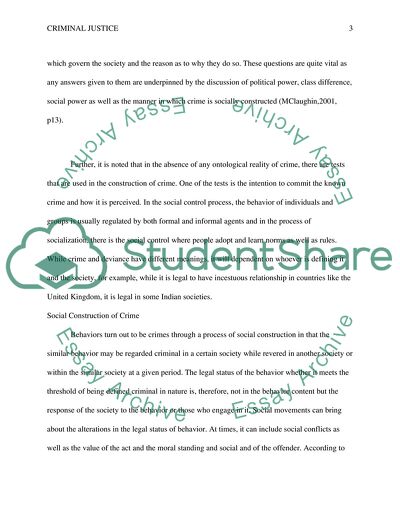
- Home
- Free Samples
- Premium Essays
- Editing Services
- Extra Tools
- Essay Writing Help
- About Us
- Studentshare
- Subjects
- Law
- Social Construction of Crime
Social Construction of Crime - Research Paper Example

- Subject: Law
- Type: Research Paper
- Level: Undergraduate
- Pages: 34 (8500 words)
- Downloads: 0
- Author: emmet45
Extract of sample "Social Construction of Crime"
Crime is usually deemed as an act that goes against the provisions of the set law as set by the legislature or any other body tasked with making laws, and its social construction varies from society to society as well as the time and the law itself. Therefore, each crime is by the particular rules, beliefs, and norms as well as the values that are in play at any given time in the history of the society. A proper analysis of crime reveals that it is an integral part of any society that can be constructed politically, economically, or culturally in the way it affects the society (McLaughlin and Muncie, 2001, p. vii). Therefore, deeds become crimes in a society through a social construction process, in that the same deeds may be regarded as criminal in one society while it may be an acceptable act in a different society at the same or different time. This means that the legal standing of a behavior whether defined as a crime or not is in not in the behavior content itself, but lies in the social reaction to the behavior in question and the alterations in the legal status of the behavior, which can be brought about by the transitions in the society.
It is also imperative that the social reaction to crime including the numerous explanations for crime is usually based not only on the nature of the act itself but also on the moral and social standing of the offender as related to that of the victim. Crime is regarded as an act that tends to break the law based on the opinion of most people. When discussing the issue of crime it is very important to take into account several concerns that are raised by a couple of questions regarding how society views crime.
Some of the questions focus on who are the people that make the rules, which govern society, and the reason why they do so. These questions are quite vital as any answers given to them are underpinned by the discussion of political power, class difference, social power as well as how crime is socially constructed (McLaughlin,2001, p13). Further, it is noted that in the absence of any ontological reality of crime, there are tests that are used in the construction of crime.
One of the tests is the intention to commit the known crime and how it is perceived. In the social control process, the behavior of individuals and groups is usually regulated by both formal and informal agents and in the process of socialization, there is the social control where people adopt and learn norms as well as rules.
...Download file to see next pages Read MoreCHECK THESE SAMPLES OF Social Construction of Crime
SOCIAL CONSTRUCTION OF CRIME AND DEVIANCE
The Clinton Impeachment Trial
Newspaper Media: Crime in Atlantic City
Explanation Of Crime And Its Context In Criminology
Crime in Media
Role of Social Structure for the Increased Crime Rate in the US
The Relationship between Criminology and Criminal Justice
Crime Is a Social Construct: Illicit Drug Use in Australia

- TERMS & CONDITIONS
- PRIVACY POLICY
- COOKIES POLICY